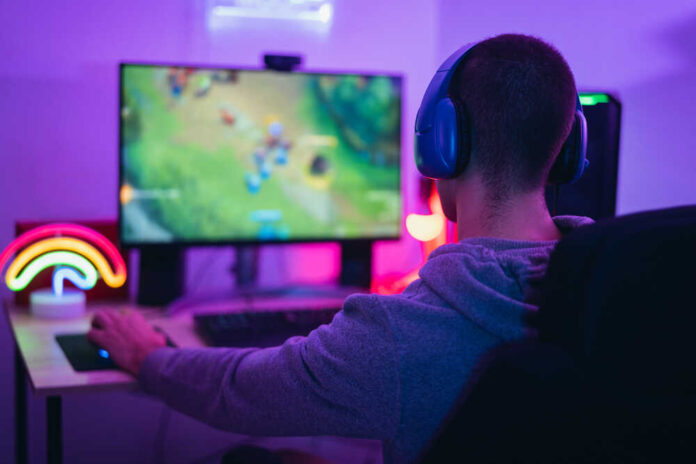
In January 2022, the World Health Organization (WHO) updated their International Classification of Diseases to include for the first time a condition called “gaming disorder“.
Similarly, the most recent edition of the Diagnostic and Statistical Manual of Mental Disorders (DSM-5-TR) now includes the condition, referred to as “Internet Gaming Disorder“.
This development underscored the pressing need to pay attention to the potential harms associated with what is generally seen as a harmless pastime. With the rise of video games as a predominant form of entertainment, understanding the risk of gaming disorder has never been more important.
What is Gaming Disorder?
Gaming disorder, as defined by WHO, is “a pattern of gaming behavior characterized by impaired control over gaming, increasing priority given to gaming over other activities to the extent that gaming takes precedence over other interests and daily activities, and the continuation or escalation of gaming despite the occurrence of negative consequences.”
This definition emphasizes that the key issue is not the amount of time spent gaming, but rather the extent to which gaming affects a person’s life. If a person is unable to stop gaming, if they are neglecting other aspects of life such as school, work, or relationships, or if they continue to game despite experiencing negative consequences, they may be dealing with gaming disorder.
It’s important to note that not all individuals who engage in gaming develop gaming disorder. The diagnosis is based on behavioral patterns that interfere with personal, family, social, educational, occupational, or other important areas of functioning, and would typically have been evident for at least 12 months.
Signs and Symptoms of Gaming Disorder
Identifying gaming disorder can be complex due to the varying ways it can manifest. However, some common signs include:
- Preoccupation with video games.
- Withdrawal symptoms when gaming is taken away.
- Tolerance, meaning that more time needs to be spent playing video games.
- Unsuccessful attempts to control the gaming habit.
- Loss of interest in previous hobbies and entertainment.
- Continued excessive use of video games despite awareness of problems.
The Impact of Gaming Disorder
Research has shown that gaming disorder can have serious consequences. Physically, excessive gaming can lead to sedentary behavior, poor nutrition, and sleep disturbances. These can result in obesity, musculoskeletal problems, and other health issues.
Mentally, gaming disorder can lead to symptoms similar to those seen in other addictive disorders, such as withdrawal symptoms when gaming is taken away, and a preoccupation with gaming that displaces other interests and activities. It can also lead to poorer performance at school or work, and strained relationships with family and friends.
Addressing Gaming Disorder
Dealing with gaming disorder requires a comprehensive approach that goes beyond simply trying to cut down on gaming time. One of the most effective treatment strategies is Cognitive Behavioral Therapy (CBT).
CBT is a type of psychotherapy that helps individuals understand and change the thought patterns leading to harmful behaviors. In the context of gaming disorder, CBT involves identifying the triggers for excessive gaming, understanding the thoughts and feelings associated with gaming, and developing healthier coping strategies.
Treatment often begins with a thorough assessment to understand the severity of the problem, the specific factors contributing to the gaming disorder, and the impact it’s having on the individual’s life. From there, a treatment plan can be tailored to the individual’s needs.
CBT for gaming disorder might involve:
- Identifying and challenging distorted beliefs about gaming: Individuals with gaming disorder often hold distorted beliefs, such as the idea that they can’t relax or feel good without gaming. CBT can help challenge these beliefs and replace them with healthier ones.
- Learning and practicing healthier coping skills: Excessive gaming is often a maladaptive coping strategy for stress or other life challenges. CBT can teach healthier problem-solving skills and strategies for managing stress.
- Developing healthier lifestyle habits: This could include improving sleep habits, increasing physical activity, and making time for non-gaming hobbies and social activities.
- Implementing gaming limits: While complete abstinence from gaming may not be necessary or desirable, learning to set and stick to reasonable limits is often a key part of treatment.
Getting Help and Getting Better
It’s okay to ask for help, and seeking professional assistance is often the most effective way to overcome any behavioral addiction disorder. Mental health professionals such as psychologists, psychiatrists, and licensed therapists are equipped with the skills and knowledge to diagnose gaming disorder and guide you through the process of recovery.
Getting better doesn’t happen overnight, but with the right help and a commitment to change, you can regain control over your gaming habits and start enjoying a healthier, more balanced lifestyle.
The key is to start somewhere. Make the choice today to take that first step towards recovery.






















